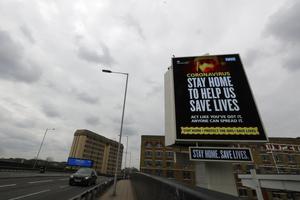 This photo shows a large advertising display issued by the National Health Service asking people to stay at home as they fight the ongoing coronavirus outbreak. In London, on April 1, 2020. (KIRSTY WIGGLESWORTH / AP)
This photo shows a large advertising display issued by the National Health Service asking people to stay at home as they fight the ongoing coronavirus outbreak. In London, on April 1, 2020. (KIRSTY WIGGLESWORTH / AP)
The novel coronavirus crisis is impacting the mental health of young people, according to a new survey by the charity YoungMinds that found 83 percent of young people in the United Kingdom with a history of mental health problems had reported a deterioration because of the pandemic.
Respondents said they were most worried about the health of their families, school and university closures, loss of routine and coping mechanisms, isolation, and a loss of social connections
YoungMinds surveyed 2,111 people under the age of 25 who have a history of mental health problems. The polling took place between March 20 – the day most schools closed to students because of government restrictions – and March 25, when further restrictive measures were put in place.
READ MORE: Philippine mayors step up pandemic response in helping communities cope with lockdown
Among respondents accessing mental health support in the lead-up to the crisis from service providers including the National Health Service, counsellors at school and university, private providers, charities, and helplines, 74 percent said they had continued to get some mental health support after the introduction of social distancing restrictions, despite the immense challenges that posed to services.
But 26 percent said they could not access support. Some had experienced cancellations because of schools closing. Others had not been able to attend peer support groups and face-to-face services because of the virus restrictions and could not access replacement services provided online or by phone.
Respondents said they were most worried about the health of their families, school and university closures, loss of routine and coping mechanisms, isolation, and a loss of social connections.
Naomi, a 21-year-old YoungMinds activist, said the crisis has made her feel anxious.
"My normal coping strategies, such as keeping a routine, getting out of the house and meeting people, are now no longer possible and this is a big trigger for my existing anxiety, which is getting worse. What would normally be quite a stressful time in my final year of university is harder at the moment," she said.
ALSO READ: Pandemic upends life in Australia
Naomi has found other coping strategies, such keeping a journal of her emotions and setting a goal of a certain number of interactions with people each day.
Emma Thomas, chief executive of YoungMinds, said: "The coronavirus pandemic is a human tragedy that will continue to alter the lives of everyone in our society, and the results of this survey show just how big an impact this has had, and will continue to have, on the mental health of young people."
Thomas added that it is a time for people to pull together and "look out for those who are most at risk in our society".
"The government must fully recognize the growing mental health impact that COVID-19 will continue to have on children and young people, and ensure that addressing this is a key component of the ongoing response," she said.


